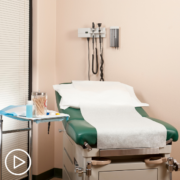Understanding the Role of a Digital Rectal Exam in Prostate Cancer Care
Understanding the Role of a Digital Rectal Exam in Prostate Cancer Care from Patient Empowerment Network on Vimeo.
Prostate cancer screening can involve different tests, but which ones are essential? Dr. Yaw Nyame with the University of Washington explains a common misconception about a prostate cancer test and and the effectiveness of PSA blood tests.
See More from [ACT]IVATED Prostate Cancer
Related Resources:

Prostate Cancer Screening and Outcomes | Impact of Racial Disparities |

|

Advanced Prostate Cancer Clinical Trials | Why Black and Latinx Participation Is Vital |
Transcript:
Lisa:
Dr. Nyame, could you explain what a digital rectal exam is and its role in the prostate cancer screening, and is the screening invasive and can men prepare for it?
Dr. Yaw Nyame:
So I am so glad that this question is here because I think for far too long, there has been this misinformation that prostate cancer screening that is effective requires a digital rectal examination. And we have a lot of data that demonstrates to us that for screening to finding cancers early, that the digital rectal examination is not necessary and it’s not effective. Effective screening requires a blood test. And that is the PSA blood test. Now, if your blood test is abnormal, we absolutely require the rectal examination for what is called staging, and that’s to understand whether you have an advanced cancer or not. That digital rectal examination means that a provider uses a lubricated gloved finger to feel the prostate through the rectum that is an invasive test, but I would say absolutely do not let the thought of the finger exam as many of the men call it, be an impediment to being screened, because really what you need to catch your cancer early is a blood test.
A blood test that most people of African ancestry should be considering in their 40s. My activation tip when it comes to prostate cancer screening is to be informed on what the best current practices are and to understand that simply getting a blood test that you can add on to your standard routine physical examination and visit with your primary care doctor starting at age 40, could significantly increase your chances of having your cancer detected early when it is curable.
Cure rates of localized prostate cancer, so cancer that is only in your prostate is somewhere between 97 to 99 percent when we catch it early, and so this blood test can save lives, we have a lot of information that demonstrates that. And I think by being aware of the benefit of screening and the harms. Okay, false positive tests, infections, some of the other things that can come downstream, you can be well informed to make a decision that suits you, and you can have these conversations with your doctor to understand whether testing is appropriate for you and when and how to pursue testing to be screened for prostate cancer.
Sherea Cary:
My activation tip for care partners it’s important that the caregiver know what the blood test, what the range should be, so that when the results are back the care partner will understand whether you or the patient need to be concerned. It’s important to have the blood test done, the PSA test, it’s important to know what it detects as a care partner, and it’s also important to know what is the range of what is normal or what is something that needs to be examined further. Knowledge is the key as a care partner.
Lisa Hatfield:
Right, thank you both Dr. Nyame and Sherea, who is a care partner. Thank you for that. Those activation tips.










